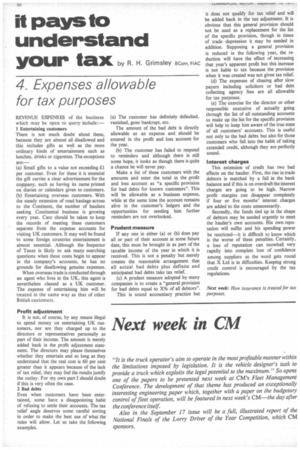it pays to understand
Page 52

If you've noticed an error in this article please click here to report it so we can fix it.
yourtax by R. H. Grimsley Bcom, FIAC
4. Expenses allowable for tax purposes
REVENUE EXPENSES of the business which may be open to query include:— I Entertaining customers
There is not much doubt about these, because they are almost all disallowed and this includes gifts as well as the more ordinary kinds of entertainment such as lunches, drinks or cigarettes. The exceptions are:—
(a) Small gifts to a value not exceeding El per customer. Even for these it is essential the gift carries a clear advertisement for the company, such as having its name printed on diaries or calendars given to customers.
(b) Entertaining overseas customers. With the steady extension of road haulage across to the Continent, the number of hauliers seeking Continental business is growing every year. Care should be taken to keep the records of meeting these customers separate from the expense accounts for visiting UK customers. It may well be found in some foreign countries entertainment is almost essential. Although the Inspector of Taxes is likely to ask many searching questions when these costs begin to appear in the company's accounts, he has no grounds for disallowing genuine expenses.
When overseas trade is conducted through an agent who lives in the UK, this agent is nevertheless classed as a UK customer. The expense of entertaining him will be treated in the same way as that of other British customers.
Profit adjustment It is not, of course, by any means illegal to spend money on entertaining UK customers, nor are they charged up to the directors or representatives personally as part of their income. The amount is merely added back in the profit adjustment statement. The directors may please themselves whether they entertain and so long as they understand that the real cost is 60 per cent greater than it appears because of the lack of tax relief, they may feel the results justify the outlay. For my own part I should doubt if this is very often the case.
2 Bad debts Even when customers have been entertained, some have a disappointing habit of refusing to settle their accounts. The tax relief angle deserves some careful sorting in order to make the best use of what the rules will allow. Let us take the following examples. (a) The customer has definitely defaulted, vanished, gone bankrupt, etc.
The amount of the bad debt is directly allowable as an expense and should be entered in the profit and loss account for the year.
(b) The customer has failed to respond to reminders and although there is still some hope, it looks as though there is quite a chance he will never pay.
Make a list of these customers with the amounts and enter the total in the profit and loss account as "a specific provision for bad debts for known customers". This will be allowable as a business expense, while at the same time the account remains alive in the customer's ledgers and the opportunities for sending him further reminders are not overlooked.
Prudent measure If any one in either (a) or (b) does pay all or part of their account at some future date, this must be brought in as part of the taxable income of the year in which it is received. This is not a penalty but merely creates the reasonable arrangement that all actual bad debts plus definite and anticipated bad debts take tax relief.
(c) A prudent measure adopted by many companies is to create a "general provision for bad debts equal to X% of all debtors".
This is sound accountacy practice but it does not qualify for tax relief and will be added back in the tax adjustment. It is obvious that this general provision should not be used as a replacement for the list of the specific provision, though in times of trade depression it may be needed in addition. Supposing a general provision is reduced in the following year, the reduction will have the effect of increasing that year's apparent profit but this increase is not liable to tax because the provision when it was created was not given tax relief.
(d) The expenses of chasing after slow payers including solicitors or bad debt collecting agency fees are all allowable for tax purposes.
(e) The exercise for the director or other responsible executive of actually going through the list of all outstanding accounts to make up the list for the specific provision will help to keep him aware of the true state of all customers' accounts. This is useful not only to the bad debts but also for those customers who fall into the habit of taking extended credit, although they are perfectly sound.
Interest charges This extension of credit has two bad effects on the haulier. First, the rise in trade debtors is matched by a fall in the bank balance and if this is on overdraft the interest charges are going to be high. Narrow profit margins can disappear completely if four or five months' interest charges are added to the costs unnecessarily.
Secondly, the funds tied up in the shape of debtors may be needed urgently to meet the haulier's own accounts. His own reputation will suffer and his spending power be restricted—it is difficult to know which is the worse of these penalties. Certainly, a loss of reputation can snowball very rapidly into complete loss of confidence among suppliers as the word gets round that X Ltd is in difficulties. Keeping strong credit control is encouraged by the tax regulations.
Next week: How insurance is treated for tax purposes.




























































































